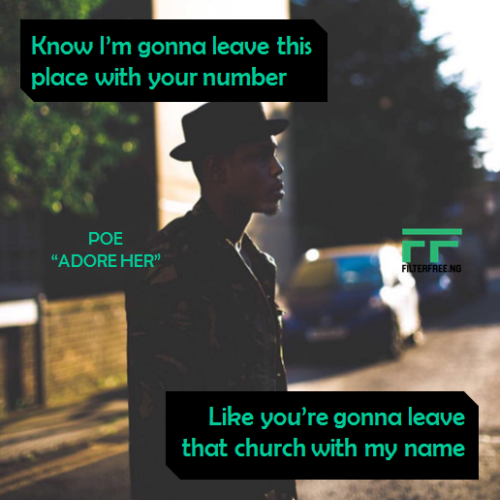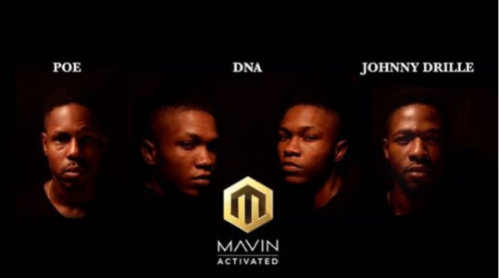Poe has signed to Mavin Records and the hip-hop community is still trying to come to terms with the implication of a move that came out of nowhere, seemingly.
https://www.instagram.com/p/BREEuwZBGuy/?taken-by=ladipoe
Poe is one of Nigerian hip-hop’s best-kept secrets but not by choice, since he came onto the scene under the wings of Show Dem Camp, the wordsmith has shown bucket loads of potential but hasn’t gotten the recognition that his immense talent deserves. Cut from the same ‘cool kid’, word play-heavy, lyric-driven, cerebral rap cloth as the great MI Abaga, Poe has long been hyped up to be next up – now is the time.
The MC has been doing music as far back as his college days in North Carolina when he was one-third of the rap group Lyrically Equipped or LEQ. Poe’s first notable appearance, however, was in 2010 on SDC’s “Victoria Island of Broken Dreams” off the first Clone Wars mixtape, where he provided a solid guest feature.

His most popular solo single till date is “Adore Her” featuring Funbi, a record off the futuristic The Collectiv3 project released in 2015. Interestingly, Poe’s new label mate at Mavin Records Di’ja was featured in the video directed by King Davies, she was the lead girl.
With a sweet hook and a powerful message of how to love and edify your woman, “Adore Her” had all it took to crossover to the mainstream and it did enjoy decent airplay, but the MC was unable to work the record to its full potential and use it as a springboard to bigger and better things. That’s where, I hope, Mavin Records could come in – to provide the structure and the push that Poe’s promising career requires.
[soundcloud url=”https://api.soundcloud.com/tracks/226090356″ params=”color=ff5500&auto_play=false&hide_related=false&show_comments=true&show_user=true&show_reposts=false” width=”100%” height=”166″ iframe=”true” /]
The phase that the suave MC is about to enter is fresh and exciting, joining one of the most successful record labels in Africa is an opportunity that comes once in an artist’s lifetime, but it is also a step up that’s filled with uncertainty about what’s to come for his growing fan base.
Through his massively impactful record labels – Mo Hits and Mavin, Don Jazzy has dictated the pace of Afropop music for the last 10 years+. It’s an amazing winning streak that has lasted from D’banj’s “Tongolo” in 2005 all the way to Reekado Banks’ “Problem” in 2016. In helping to define the soundscape of Afropop, Don Jazzy (and his production team) have embraced different genres, from electronic music to R&B to funk to highlife and many more. But one genre that the legendary producer seems to have struggled to embrace wholeheartedly is hip-hop music.
Rappers who pass through Don Jazzy’s recording studio are typically remodeled into pop artists, as wholesale changes are made to their sound. It’s a formula that has been repeated time and time again with varying degree of change, here’s a roll-call of Jazzy’s MC’s-turned-Afropop stars:

Dr. Sid
Dr. Sid started off as a choreographer and backup dancer for legendary hip-hop collective Trybesmen, eventually becoming an important member of their offshoot Da Trybe. Sid, or Sidius as he was also known back then, was influenced heavily by hip-hop culture – in his style in the videos and in his early music. Listen to his first single on the label “No long Thing”.
The MC was originally to release an album called The Prognosis but he shelved those plans. Sid joined Mo’ Hits in 2007 and started his gradual shift to a more radio-friendly sound that began in earnest after the Curriculum Vitae collaborative project. Today, he is the autotuned singing voice behind pop hits like “Pop Champagne” and “Something About You”.
D’Prince
D’Prince has had a less storied rap career than Sid but being Don Jazzy’s younger brother, he was a day zero member of the Mo’ Hits team. In the early days, D’Prince was positioned as the rapper within the crew. On the collaborative album Curriculum Vitae (2007), Prince provided rap verses to the big pop singles “Booty Call” and “Close To You” and on his solo effort “Igbe Mi”, he all but announced himself as an MC with ‘A1 street cred’.
To be honest, D’Prince was never really lauded for his skills on the microphone, there was something kiddish and cut-and-join about the way he put rhymes together. Over the years, Omoba has had probably the biggest evolution of the original cast members of Mo’ Hits – from an unremarkable rapper to a serial hit maker to a social crusader, of sorts.
Kay Switch
During the Curriculum Vitae era, Kay Switch was an interesting character in the crew because rather than be known for one musical style like the rest, he performed a hybrid of rap music and dancehall. Sadly, of all the Mo’ Hits alumni, Kay Switch went on to have the least successful solo career, but – in my opinion – it’s not because he was a jack of two trades but largely because he was physically absent in a lot of the crew’s early success through school.
While schooling in Ghana, Kay Switch made a name for himself in the hip-hop community and worked closely with other Nigerian MC’s in the circuit like Mr. Walz. These days though, Kay stays well clear of hip-hop, Afropop is more his speed. Having never released a solo record on Mo’ Hits, it’s hard to tell when exactly that transition happened and how much the team put together by his elder brother and Don Jazzy had a hand in it.
Ikechukwu
Ikechukwu started working closely with Don Jazzy as early as his debut album Son of the Soil (2007), when the MC was still on Storm Records. Don Jazzy produced the song “Do” featuring D’banj, which, unsurprisingly, was one of the LP’s more expansive efforts. Their rapper-producer relationship blossomed on the returnee’s sophomore effort Life & Times Of Killz Vol. 1 where they did more work, until eventually Ikechukwu transitioned fully to Mo’ Hits on his third album The Alliance (2010). “Do” was never released as an official single, but you can listen below:
While he would go on to release smash hits like “Wind Am Well” “Critical” and “Now is the Time” in his time on Mo’ Hits, Ikechukwu’s core identity as an MC was never altered and away from the big, shiny singles, the rest of the songs on his solo efforts remained true to his hip-hop background. Killz was actually the only rapper on the team with studio albums and a sizable fan base before the deal, so perhaps that’s the reason why he had the least reconstructive work done to his sound.
There’s a strategy we’ve unraveled here but the reason behind it was blown open in 2012, when Don Jazzy confirmed in words what his actions had already indicated. In an interview with HipHopWorld, the producer stated that, in his opinion, any Nigerian who ventures into rap music wouldn’t get respect from their parents.
His words:
If you decide that you want to do rap, there is one thing that you should put at the back of your mind; you parents are not proud of you whether you like it or not…
I think Modenine is a very good rapper but I’m not a big fan of his music because that’s like the old school of rap. I really can’t understand, I can’t take dictionary and be listening to your lyrics, I’m sorry
You get Don Jazzy’s larger point. Historically, English-speaking, lyrical MC’s have struggled to transition into the mainstream and become successful – it’s a fact, MI is the exception, not the rule – so Poe has his work cut out for him to become valuable to the Mavin organization from a business standpoint, but Jazzy’s comment was done in bad taste and it undermined the lifework of an entire community of artists and an entire culture. Unsurprisingly, one of the culture’s foremost protectors, Terry tha Rapman forced a semi-apology out of the legendary producer but it wasn’t surprising that the batch of Mavin Allstars signed a couple of years after that interview didn’t contain any MC’s.

Mavin Allstars – Poe, DNA, Johnny Drille
However, this new batch has one and he’s a heck of a good one! The fear is – given the antecedent of his boss, how long will Poe remain that way? There will be changes to the sound and marketing strategy for brand Poe – there has to be, it’s obvious something wasn’t working – but by how much and in what direction? Time will tell. But with Don Jazzy being less hands-on with production these days, I am less fearful that there will be reconstructive surgery performed on the actual music. Plus the very fact that Mavin would welcome artists like him and Johnny Drille, who are quite different from what they have on the roster, is an indication that perhaps things are slowly changing at the SMD HQ.
Fans of hip-hop often hyperventilate when their favorite MC emerges from the rat race of the underground scene and signs a major record deal – a lot of folks either say the rapper has ‘sold out’ and expect the music to change or feel like s/he has ‘made it’ and no longer needs their support since they’ll have a wider audience going forward. But that’s a dangerous and unhealthy habit of punishing success, Poe needs the backing of every fan he has amassed over the years. He hasn’t reached Uhuru yet, so don’t stop supporting now, and neither has he committed a cardinal scene by signing with Mavin Records. He’s just made a move that could actually end up being in the best interest of his career, and if your favorite rapper isn’t doing music to be the biggest star they can possibly be, then what exactly are they doing it for and why exactly are you still supporting them?
Having said that, given the historical context and Don Jazzy’s previous stance on rap music, you can understand the apprehension about what’s about to happen next. Poe is one of the brightest stars in the Nigerian hip-hop orbit, if he becomes just another shiny object in the Mavin (and Mo’ Hits) pop star constellation, then Nigerian hip-hop culture would have lost a real one.


